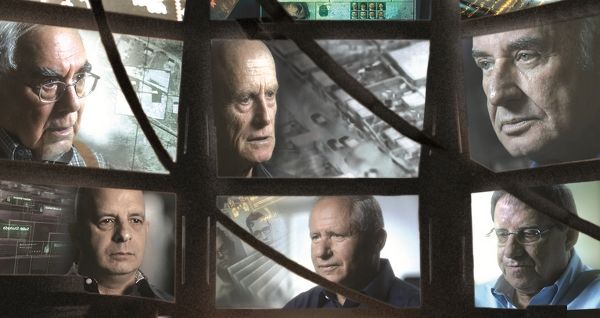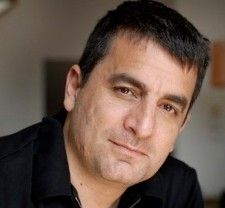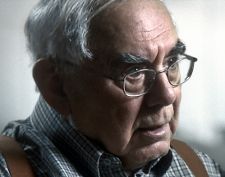
Dror Moreh's Oscar-nominated documentary The Gatekeepers plays at both Seret and Sheffield Doc/Fest this week. The film uses the direct testimony of the six living former heads of Israel's secret service Shin Bet - Ami Ayalon, Avi Dichter, Yuval Diskin, Carmi Gillon, Yaakov Peri and Avraham Shalom - to explore the men's views on the ongoing conflict between their country and the Palestinians. The men, despite their differences, speak in one voice on that issue at least, arguing that dialogue and a two-state solution are the only constructive way forward.
Catching up with Moreh over the phone this week, we talk about the difficulties of interrogating men who have built their careers on asking questions rather than answering them.

"Of course, I was very, very nervous in the beginning but it was a few interviews with each one. The more you know them personally, I would say, the more you control the material - about what they speak - about what it means to be a Shin Bet operative and head of Shin Bet. The more you are confident with yourself. The most difficult interview I had was with Avraham Shalom about the 300 bus incident. This is one of the most exhausting experiences of my life. And believe me, I've done interviews with militia, Ehud Barak, with Ariel Sharron and this was one of the toughest ones."
The Bus 300 hostage taking which resulted in two hostage-takers being killed on Shalom's orders as part of a cover-up is a key sequence in Moreh's film and he makes good and innovative use of the limited visual material that was available to him - animating still photography from the night in question so that we are immersed in the event.
"I kind of developed the visual language simultaneously [while doing the interviews]," he says. "The 300 incident and the photos were developed together. I knew what I would have from the 300 line incident, because those photographs were the only thing there so I knew that I had to create something from the photos. So this was coming together simultaneously."
Despite initially claiming "I don't remember" when asked about that fateful night, Shalom was persuaded to open up by Moreh, who explained to him that the other men would talk about the incident whether he did or not and that this was a chance to put his side of the argument. In the end, the director says he was surprised by just how candid the men were.
"A few times I was even shocked... moved," he says. "It was very, very moving for me and interesting - all the interviews that I did, and I interviewed each one of them for a long, long period of time. It was very interesting. As a filmmaker, as an interviewer, when you have a good interview, you feel it in your gut and each time I finished an interview with one of them, I felt that I had really priceless material. The only thing that I was worried about, in terms of the film, is to match the potency and honesty and overwhelming power of the interviews with the visual language. This was my only concern, that I would manage to create a movie, which means bringing into that content really good and impressive and supporting archive material that will create the experience I wanted."
With two decades of working as a cinematographer behind him, on films including Asesino and Desperado Square, Moreh needn't have worried, as he carefully illustrates what the men are saying without slipping into hyperbole.
Moreh was inspired to make the film after learning, while working on a movie about Ariel Sharron (Sharon, 2008), that the former Israeli prime minister had been encouraged to take a new tack after reading an article with four of the former Shin Bet heads that suggested his current policy would lead Israel into disaster.
"When I interviewed his chief of staff he said it moved him and changed all kinds of things," says Moreh, "So when I heard that, I thought if we can manage to bring all six of the heads of the secret service, Shin Bet together, it will probably have the same effect. This is why, from the beginning, I wanted to create it. Although, you never know when you start a project what the reach will be."

The reach, it turns out, has been sizeable. Aside from festival play across the world and the publicity that only being nominated for an Oscar can truly bring, the film has now been transformed into a five-part television series that is currently being shown on Israeli TV.
"Actually, I was in the mixing room all day long for the fifth chapter," says Moreh. "So the first chapter was broadcast last Sunday and it's going to be each Sunday at 9pm, in primetime, all the five hours of The Gatekeepers."
"The response is overwhelming all over," he adds. "So I'm very happy with that and excited. Basically, you're calling me just at the finishing line of the editing and colour mixing and grading of the last chapters.
"It is quite liberating to be able to do that because the editing process was very difficult because of the amount of really amazing material I had in the interviews because of the stories that had to be told and I couldn't do that because of the time pressure in the movie. So it was kind of a release mechanism for me when they gave me the authorisation for this series of five chapters, five hours basically."
And he is also happy that television is bringing the debate to a whole new audience.
"The first chapter, according to the ratings had around 500,000 people watching. In the cinema, in Israel, we had 80,000, which is an amazing number for Israel but the broader reach is in television."
So does he feel the film is opening the debate with how Israel can engage with Palestine?
"It's definitely is a long, long road," he admits. "But it does create a debate, it does have a resonance - definitely, in the political arena, where politicians are speaking about it a lot. I was in a screening of the movie, the day before yesterday. There was a debate afterwards with one of the centre right party and one from the left wing and one of The Gatekeepers and me and the debate is there. They are thinking of bringing it into the Knesset and showing it there. I hope that it will change people."
And as for his interviewees, "they don't like each other much, that I can tell you frankly," he says. "But for me, the importance of bringing six members of Shin Bet to the movie was the potency of the six heads of Shin Bet speaking for the first time, conveying the message, almost at the end, in one voice. Although the differences between them are very evident in moral issues and things like that, when it comes to the conclusions about the Israeli/Palestinian conflict, I can say that they speak almost in one voice. That was very important to me and that's what makes the movie so potent and so strong."
Potent is a very good word to describe the argument The Gatekeepers gradually builds. I long to ask Moreh more about what the future holds for him but he has to go and pick his son up from the local barracks. A reminder, perhaps, that for many in Israel - where both men and women must complete national service - the spectre of conflict is never far away.
The Gatekeepeers screens at Doc/Fest 2013 on Friday, June 14, 3.30pm, Showroom 4 and on Sunday June 16, 10.15am, Showroom 2 - visit the festival website for tickets. It screens at Seret on Friday, June 14, 9pm, Hackney Picturehoue and Sunday, June 16, West London Synagogue. Tickets and details from the festival website.





















